

Feature
Reappraising Gov. Ugwuanyi’s giant strides in Enugu State – Louis Amoke
Reappraising Ugwuanyi’s giant strides in Enugu State
By Louis Amoke
For a better appreciation of the good works of Gov. Ifeanyi Ugwuanyi’s administration in Enugu State, it will be rational to assess its stewardship from the standpoint of the nation’s economic adversities when the governor took over the mantle of leadership in May 29, 2015.
When the governor assumed office, the country was in recession and confronted with various degrees of economic challenges as a result of drastic drop in the crude oil prices which adversely affected the state’s allocations from the federation account.
This recurring decimal of paucity of funds, coupled with the inherited debt profile and other huge wage bills to be serviced, no doubt posed a serious threat to the speedy actualization of the government’s well-thought-out vision for the people of the state as contained in its four-point agenda.
Enugu State was among the worst hit, considering that it is third from the bottom of the revenue allocation chart from the federation account and predominantly a civil service state with high expectations for socio-economic expansion borne out of its enviable status as the historical capital of the Eastern region, old Anambra State, old Enugu State and capital of the present Enugu State.
The situation was really a source of worry to the extent that the immediate past governor of the state, His Excellency, Sullivan Chime, during the thanksgiving Mass to commemorate the end of his administration acknowledged that Enugu’s purse was growing leaner as federal allocations dwindled to an all-time low.
The nation’s economic challenges then was so bad that 27 states, Enugu State excluded, could not pay workers’ salaries, not to talk of embarking on capital projects. The era of sharing of excess crude oil funds which enabled past governments at the state and local government levels to execute sundry capital projects became a thing of the past as the governors resorted to bailout funds from the federal government to enable them to meet up the basic pressing needs of paying workers’ salaries and execution of projects, among others.
They were consequently tagged “bailout governors” and the burning question then was “is this the best time to be a governor?”
But, Gov. Ugwuanyi in his wisdom, sheer dexterity and passion for wellbeing of the people as well as rapid development of the state, remained undaunted in his vision to build Enugu State of the founding fathers’ dreams – to deploy government services to create fair and equal opportunity for every willing citizen to make a living and create wealth, educate our children, and enjoy life in a peaceful and secure environment.
In actualizing the lofty dreams, the people’s governor, constituted a 15-man Enugu State Economic Advisory Committee headed by Msgr. Obiora Ike, to advise his administration on the best policies that would engender sustainable economic growth to lead the state out of the nation’s economic crunch, through restructuring, re-engineering and reinvigoration of the state’s economy.
The innovative approach gave birth to the first ever Enugu State Investment Summit christened “Oganiru Enugu State”, which was successfully organized to showcase the economic potentials of the state and woo investors.
Recently, Enugu State was rated by the World Bank Group as the second most advanced state in Nigeria towards the frontier of global good practices with regards to Ease of Doing Business.
On workers’ salary which was a major puzzle for most states, the story is quite different in Enugu State as workers continue to receive their pay on the 23rd of every month, even when it falls on a Saturday or Sunday. The state government last year paid the 13th month salary to its workers as Christmas bonus and also pays the pensioners on or before the end of the month.
Through an impressive increase in the state’s Internally Generated Revenue (IGR), as a result of far reaching reforms introduced in the sector by the governor, this years’ June and July salaries were paid without the receipt of the federal allocations.
At the peak of all these challenges, execution of capital development projects were going on speedily across the three senatorial districts, coupled with state government’s swift interventions on failed sections of federal roads in the state.
Consequently, Gov. Ugwuanyi who was recently named the “2018 Sun Governor of the Year” for good governance; rapid rural development; traders and youth empowerments; nurturing of peace and harmony among the political class and critical support for security agencies, among others, has indeed kept faith with his campaign promises to the people of Enugu State.
Presently, the state government has so far spent close to N50 billion on road construction and rehabilitation across the state, covering about 450 kilometres.
Apart from road projects, the Gov. Ugwuanyi administration has also taken bold steps in other spheres of development which have endeared him to the people of the state and beyond and equally earned him a gale of endorsements for his re-election by virtually all strata of groups in the state, including the religious and traditional institutions.
The areas include the traders empowerment scheme which has so far assisted 2400 genuine traders with the sum of N50,000 each to grow their various businesses; construction and renovation of over 589 primary and secondary school blocks in the state as well as procurement of learning tools and employment of over 4000 teachers; empowerment of 750 youths under the Sustainable Development Goals (SDGs) programme.
Others include, provision of 100 units one bedroom apartment for 100 lucky civil servants under grade level 1 to 10; rehabilitation of facilities at Ajali and Oji River Water Treatment Schemes which has consequentially improved the supply of water to Enugu metropolis and its environs; construction and renovation of district hospitals and health centres in the state, especially in the rural areas under the primary healthcare programme, such as the Poly Clinic, Asata, Enugu and Udi District Hospital; construction of 14 new court buildings and open registries in the judicial divisions and magisterial districts across the state, which the state’s Chief Judge, Hon. Justice Ngozi Emehelu, described as “unprecedented infrastructural development that has not been witnessed in the entire South East” and “the largest single intervention in infrastructural development in the Judiciary of Enugu State for over 20 years”; and other remarkable achievements too numerous to mention.
On rural development and good governance, Gov. Ugwuanyi’s administration in line with its vision to create direct positive impacts on the lives of the masses, the long forgotten and neglected, channeled the bulk of its development projects to the rural areas – a clear and systematic departure from the past when most major achievements were concentrated in the urban areas.
This vision which is novel in the state’s history was also in keeping with the governor’s inaugural address to “pay a special attention to rural development,” to open up the rural areas, create more urban centres, develop fresh economic opportunities and reduce pressure on Enugu metropolis for socio-economic expansion.
Three months into his administration, Gov. Ugwuanyi spearheaded the massive development of urban and rural roads across the three senatorial districts of the state, in Emene, Abakpa-Nike, 9th Mile Corner and Nsukka – a University town founded over half a century ago and the second largest town in the state, among other satellite towns.
Shortly after, his administration simultaneously executed 35 grassroots development projects across the 17 Local Government Areas of Enugu State, which ensured that every council benefited at least one project from the programme.
Today, we have the N10 million “one community, one project” scheme, which has also recorded a huge success in expanding development to the frontiers of the rural areas – an initiative that has made it possible for communities to decide their priority projects, ensuring that areas that never experienced any government presence benefited, accordingly.
All these were going on as completion of works on projects started by the previous administration were given adequate attention, such as the state-of-the-art Enugu State Diagnostic Centre, (now completed) the first of its kind in the South East geo-political zone, established to create hospital chains to make Enugu the preferred destination for receiving high quality and affordable healthcare delivery in the country.
Besides the foregoing, the following road projects were equally among the projects successfully delivered to standard by Gov. Ugwuanyi’s administration with special positive impact on the lives of the people, especially the lowly and long neglected.
The two 9th Mile Bypasses in Udi Local Government Area, which have relieved travelers the stress of traffic gridlock in the area, especially during festivities. The Agbani-Amurri road in Nkanu West LGA, newly constructed for a community that has never experienced any form of development on its land in the past 100 years. The Ogonogoeji-Ndiagu-Akpugo road (from Atavu bailey bridge to Afor Onovo), in the same council, which has a historic and symbolic attraction as the first state government road project in the entire Akpugo zone since the creation of Enugu State.
Another project that has a direct impact on the lives of the lowly and neglected is the Ngenevu road, which was constructed with the provision of two 500-KVA transformers by the governor for the suburb of Enugu that had not witnessed any form of government presence. Other high density and suburbs such as the Iva Valley, the Ugbodogwu, the Ogwuagor, Abakpa Nike, Emene, etc, have equally benefited.
The story is the same in Eha-Amufu, Isi-Uzo Local Government Area – another long neglected agrarian community that is currently witnessing massive reconstruction of the Nkalagu-Eha Amufu road, after over 35 years of neglect.
Others include, the Nike Lake road and Abakpa Nike road in Enugu East Local Government Area, which were hitherto in deplorable conditions. The Opi-Nsukka Dual Carriageway in Nsukka Local Government Area, delivered with the state-of-the-art facilities befitting a University town and the second largest city in the state. The Ogbaku road in Awgu L.G.A (one of the 35 simultaneous development projects) that was constructed on a difficult terrain that is both hilly and undulating.
The New Market-Milliken Hill-Ngwo- 9th Mile road, an ancient, historic and undulating road, modernized with streetlights and other safety measures after decades of neglect to showcase its potentials as a tourist attraction and the state’s natural roller coaster, which now serves as an alternative gateway into the city of Enugu, from Onitsha-Enugu expressway. The Ebonyi River Bridge in Isi Uzo Local Government Area, which connects so many adjoining communities to Ikem, the headquarters of the Council, and a host of others.
Numerous development projects have also been executed in the urban areas, such as the Holy Trinity Street and Bishop Michael Eneje Street, Independence Layout, Enugu; Mount Crescent, GRA, Enugu; Orofia Street, off Nza Street, Independence Layout, Enugu; Dental School – Tipper Garage road, Trans Ekulu, Enugu; Loma Linda- Timber Shed road, Maryland, Enugu; Nwafia Street, Independence Layout, Enugu; Mbanefo Street, New Haven, Enugu.
Others include, the Secretariat Road, G.R.A, Enugu; Court Avenue by new State Secretariat, Enugu; Ibuza Street at Independence Layout, Enugu; Isi Uzo Street at Independence Layout, Enugu; Owerri Road and Poly Clinic Road, Asata, Enugu; Renovation of the Enugu State House of Assembly Complex and rehabilitation and re-asphalting of the popular Michael Okpara Square, Enugu, and a host of others. A lot of new projects scattered in the state are ongoing and more contracts are been awarded to improve the people’s standard of living.
Not too long ago, Gov. Ugwuanyi’s administration ensured that Enugu State had additional five new state-of-the-art fire service stations across the three senatorial districts, after 56 years three stations were built in the state, then Eastern Region.
The government has consistently been maintaining roads built by past administrations and has equally engaged 1000 youths under the Enugu Clean Team Project to clean up the state to enhance and sustain its rating as one of the healthier and cleanest cities in the country, among other landmark achievements.
From the above narrative, which is just a tip of the iceberg, it is well established that the present people-oriented administration in Enugu State has kept faith with its sacred mandate to transform the state and impact positively on the lives of the people – the true heroes of democracy. Truly, Enugu State is in the hands of God.
Feature
Ex-Oyo Governor Ladoja Installed as 44th Olubadan of Ibadan
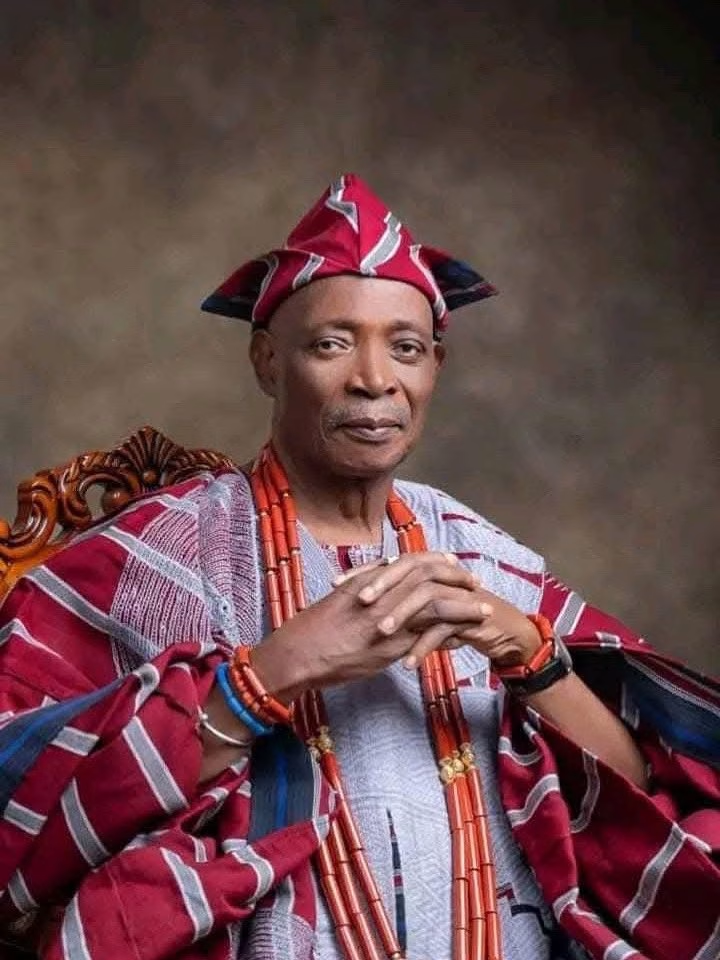
The odyssey of Senator Rashidi Adewolu Ladoja to the ancestral throne of Ibadan is not only historic but profoundly political, laced with trials and triumphs.

History often unfolds slowly, like a scroll revealing one line at a time. In Ibadan, a city steeped in tradition and resilience, history has once again taken a defining turn.
Oba Rashidi Adewolu Ladoja, former governor of Oyo State, businessman, politician, and activist, is now preparing to ascend the exalted throne as the 44th Olubadan of Ibadanland.
His decades-long journey, filled with trials, victories, and service, tells a compelling story of destiny, courage, and legacy. From political powerhouses to royal lineage, from boardrooms to the battlefields of democracy, Ladoja’s life blends tradition with transformation. His ascension is not only personal fulfilment but also a cultural and historical moment for Ibadanland.
Indeed, his coronation stands as a milestone, a testament to resilience, faith, and destiny fulfilled. On September 26, 2025, Oba Ladoja will be crowned the 44th Olubadan of Ibadanland, closing a circle that began 34 years ago when he became Mogaji of his family compound in Isale-Osi. But this is no ordinary coronation; it is the culmination of a saga defined by ambition, resistance, exile, betrayal, resilience, and ultimately, triumph.
Road to Royalty: From Mogaji to Monarch
It began in 1991 when Rashidi Ladoja became Mogaji (family head) of the Arusa compound in Isale Osi, a deeply rooted quarter in Ibadan South-West Local Government Area. That symbolic beginning marked the first step on Ibadan’s rigorous 36-step chieftaincy ladder, reserved for those destined to wear the revered crown.
The Ibadan succession system is unique among Yoruba kingdoms. Unlike other traditional stools where royal families are narrowed to specific lineages, the Olubadan system is remarkably open and transparent. Two lines of succession, the civil (Otun) and the military (Balogun), run concurrently, and candidates rise step by step until the next in line becomes Olubadan. It is an orderly system that rewards longevity, patience, and service, making the throne one of the most respected in Yorubaland.
On October 1, 1993, Ladoja was installed as Jagun Balogun Olubadan, formally entering the military line of succession. Over the next 31 years, he advanced steadily, surviving political turbulence, personal setbacks, and traditional disputes. Few endure the politically charged and physically demanding journey to the top, but Senator Ladoja did — with grit, patience, and determination.
“I never imagined destiny would call me to the throne at this time. It’s been one of patience, perseverance, and grace,” Oba Ladoja told a gathering at his Bodija residence after his official nomination.
Political Elite Meets Royal Heritage
In a city of warriors and statesmen, Oba Ladoja is the first former governor and senator to become Olubadan.
Trained as a chemical engineer in Belgium, he made his mark in oil, shipping, banking, agriculture, and transport before rising as a political force.
During the short-lived Third Republic, he was elected senator on the platform of the defunct Social Democratic Party (SDP). In 2003, he defeated incumbent Lam Adesina to become Governor of Oyo State on the platform of the Peoples Democratic Party (PDP).
Two years later, he was impeached in what many described as a conspiracy driven by then-President Olusegun Obasanjo and political strongman, Lamidi Adedibu. His reinstatement by the Supreme Court after 11 months in exile was more than a legal victory — it was a political resurrection. It cemented his reputation as “the indomitable warrior”, a man political opponents could not erase or ignore.
That resilience, combined with patient navigation of Ibadan’s chieftaincy system, has now borne fruit.
“It has been a bumpy journey filled with trials, but only made possible by the grace of God,” he told jubilant supporters.
Defiance and Reconciliation
Ladoja’s political career was often defined by principles that put him at odds with powerful figures.
In 2018, when then-Governor Abiola Ajimobi crowned Ibadan High Chiefs as kings, Ladoja stood alone in defiance. He rejected what he called a “carton-paper-made” beaded crown, declaring that the only crown worthy of him was the Olubadan’s. His refusal sparked years of political and legal confrontation.
“Why should I wear a crown not recognised by tradition?” he asked. “The throne is not for the desperate.”
Yet, in August 2024, in a radio interview, he softened his stance, saying unity was more important than pride: “The voice of the people is the voice of God. I am ready to accept the beaded crown if it will bring peace and allow me to serve the people of Ibadan.”
That statement shifted the atmosphere. His colleagues in the Olubadan-in-Council rallied behind him, and he was soon unanimously nominated and approved by Governor Seyi Makinde as the 44th Olubadan.
Unlike his clashes with Ajimobi, Ladoja’s relationship with Governor Makinde has been cordial and strategic. Makinde’s prompt approval of his nomination reflected a convergence of political and traditional power, a necessity in Oyo State where the Olubadan stool carries both cultural influence and political weight.
The Crown and the City
Ibadan is no ordinary city. It is the largest traditional Yoruba urban centre and the historic political capital of the old Western Region. The Olubadan, though largely symbolic, wields influence over millions.
For Oba Ladoja, this reign is not ceremonial. It is an opportunity to redefine the stool, blending cultural authority with political wisdom.
“I pray that my reign shall bring peace, prosperity, and progress to Ibadanland,” he said, calling for unity.
Expectations are high. From Oke Aremo to Abuja, all eyes are on him to redefine the modern monarch’s role not just custodian of rituals, but guardian of peace, diplomacy, and security. He has already urged coordinated efforts to secure Ibadan and Yorubaland amid rising insecurity.
The coronation of Oba Ladoja is more than a local event; it is a national stage. Expected guests include President Bola Tinubu, former Vice President Atiku Abubakar, Senator Rabiu Kwankwaso, former governors, business moguls, activists, and traditional rulers across Yorubaland and beyond.
Their presence underlines the symbolic place of Ibadan in Yoruba and Nigerian politics.
Activism, Sacrifice, and Legacy
Ladoja’s story is not just about royalty; it is about activism and identity. As a NADECO stalwart, he stood against military rule in the 1990s, supporting the pro-democracy struggle after the annulment of the June 12 election.
Chief Adeniyi Akintola (SAN) recalls: “We used his ships for NADECO’s activities after the Senate was dissolved. His businesses were seriously affected — he had a shipping line and the largest palm plantation in West Africa then.”
As governor, he challenged a sitting president. As High Chief, he resisted compromising tradition. As a businessman, he sacrificed fortune for democracy. Now, as Olubadan, he embodies the fusion of political power and cultural authority.
To former Nigerian Ambassador, Dr. Yemi Farounbi, “Ibadan is the intellectual capital of Nigeria. It provided security for the Yoruba in times of war. Peace must return, and the Olubadan must lead it.”
Professor Tunde Adeniran, a former minister, added: “He comes with experience and expansive networks. Expectations are high. We must rally around him.”
For younger Ibadan residents, his ascension represents continuity and hope. “We grew up hearing about his struggles as governor and his fight for justice,” said Akeem Alabi, a postgraduate student at the University of Ibadan. “Now he is our king. We expect him to stand for the people, just as he did in politics.”
The Crown After the Storm
For many, the crowning of Oba Rashidi Ladoja is poetic justice, a fitting epilogue to a life of battles in politics, business, and tradition.
From Mogaji in 1991 to Olubadan in 2025, from impeachment to reinstatement, from defiance to reconciliation, he now wears the crown not as a reward but as a responsibility.
The royal father is no longer just the “cat with nine lives”; he is the king whose destiny has come full circle.
Governor Seyi Makinde has expressed readiness to work seamlessly with Oba Ladoja towards the development of Ibadan city, describing the new monarch as an exemplary leader whose wealth of experience in politics, business, and community service will enrich the Olubadan stool.
Makinde recalled that his own political journey could not be written without Ladoja’s role, stressing that: “Baba remains a father figure whose guidance has shaped many of us. I hold him in high esteem, and I believe Ibadan and Oyo State will benefit from his reign as Olubadan.”
As Ibadan embraces this new chapter, the coronation of Oba Rashidi Adewolu Ladoja stands as both history and prophecy fulfilled a story of destiny, resilience, and triumph, written across the canvas of politics, tradition, and legacy.
CULLED FROM THE GUARDIAN
Feature
𝗜𝗻𝘁𝗹. 𝗗𝗮𝘆 𝗼𝗳 𝗣𝗲𝗮𝗰𝗲: 𝗛𝗼𝗻. 𝗢𝘁𝘂𝗼’𝘀 “𝗡𝗼 𝗗𝗶𝘀𝗰𝗿𝗶𝗺𝗶𝗻𝗮𝘁𝗶𝗼𝗻 𝗣𝗼𝗹𝗶𝗰𝘆” 𝗮 𝗣𝗮𝘁𝗵𝘄𝗮𝘆 𝘁𝗼 𝗣𝗲𝗮𝗰𝗲𝗳𝘂𝗹 𝗔𝗻𝗱𝗼𝗻𝗶
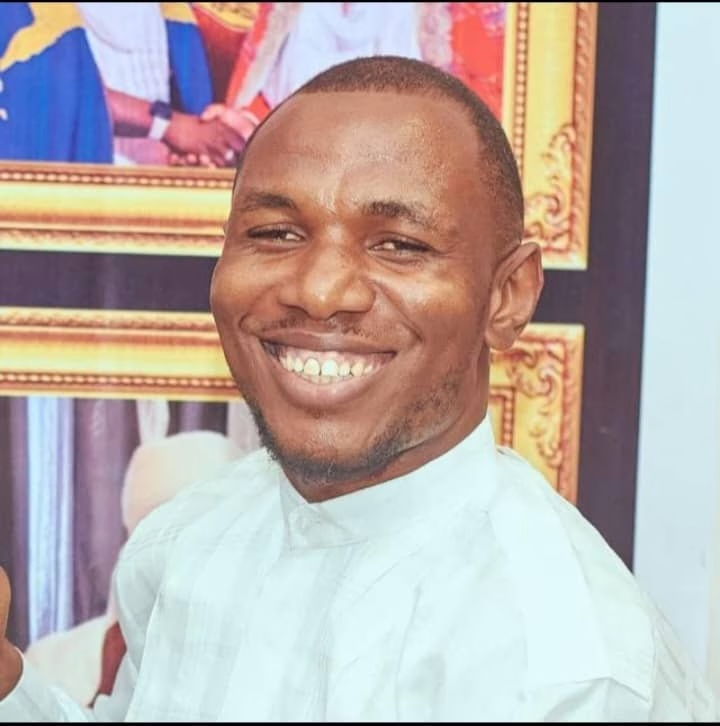
By Ima-owaji G. Shedrack
As the world commemorates the International Day of Peace, attention has once again shifted to the bold and inclusive policies of the Chairman of Andoni Local Government Area, Hon. Promise Lucky Otuo, whose leadership style has been described as a model for peacebuilding and sustainable development.
Since assuming office, Hon. Otuo has consistently emphasized that his government is a “no discrimination government,” a philosophy set to guide his policies and programs across the council.
In a remarkable demonstration of this principle, the Chairman extended empowerment opportunities not only to indigenes but also to non-indigenes residing and trading in Andoni. This inclusive approach, observers say, has deepened trust, fostered unity, and reduced the tensions that often arise from feelings of neglect or inequality.
Mr. Ima-owaji G. Shedrack, a stakeholder in the Renewed Hope family, applauded the initiative, noting that Hon. Otuo has shown that peace is not just about preventing conflict but also a conscious steps in building an environment where fairness and inclusiveness are at the center of governance.
“As Andoni joins the world to mark the International Day of Peace, Hon. Lucky Otuo’s leadership style that is anchored on ‘no discrimination’ is built to offer a clear roadmap, where peace is not only preached but practiced through deliberate policies of fairness and equal opportunity.”
Follow BONA NAIJA for more
Feature
Eid-ul-Mawlid: Uphold Hon. Lucky Otuo in your prayers, Ima-owaji Shedrack Urges non indigenes in ANOLGA

A stakeholder in Andoni Local Government Area of Rivers State, Ima-owaji Shedrack, has called on Muslim faithful in the area to remember the Chairman of Andoni LGA, Hon. Lucky Promise Otuo, in their prayers as they celebrate Eid-ul-Mawlid, the commemoration of the birth of Prophet Muhammad (SAW).
Speaking on Friday during the nationwide celebration, Ima-owaji stressed the importance of continuous prayers for leaders at all levels, describing Hon. Lucky Otuo’s administration as one that transcends sentiments, tribal lines, and religious differences.
“The government of Hon. Lucky Otuo is one beyond discrimination. Both indigenes and non-indigenes are carried along. This is why I urge our Muslim brothers and sisters to use this sacred celebration to pray for him and for the peace, progress, and prosperity of Andoni LGA,” Ima-owaji said.
He further noted that the Eid-ul-Mawlid celebration provides Muslims with another opportunity to renew their commitment to unity and inclusiveness, while also offering prayers for leaders who are steering the affairs of the people with sincerity.
Ima-owaji urged residents of Andoni, regardless of religion or origin, to embrace peace and support the development agenda of Hon. Otuo’s administration, which he said is focused on progress and inclusivity.
Follow BONA NAIJA for more
Feature
What to Know About CBN’s New Geo-Tagging Requirement for POS Terminals
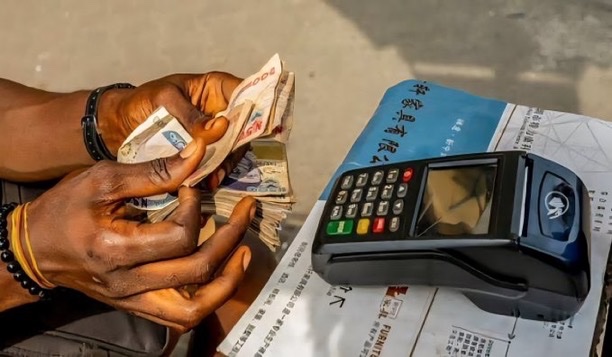
The Central Bank of Nigeria (CBN) has issued a new directive requiring all Point of Sale (POS) terminals to be geo-tagged within the next 60 days, a move designed to curb fraud, enhance oversight, and modernize Nigeria’s digital payment ecosystem.
According to a circular released on August 26, 2025, any terminal not geo-tagged will be deactivated from October 20, 2025.
“This initiative is designed to ensure that all PoS terminals are traceable and that transactions are secure. Terminals operating outside their registered location will be flagged, and non-compliant devices will be deactivated,” the CBN stated.
Here’s a breakdown of what the policy means for operators, agents, merchants, and customers.
What Geo-Tagging Means
Geo-tagging is the process of embedding location data, such as latitude and longitude, into a digital device.
For POS terminals, this means linking each machine to its exact physical address using GPS technology, creating a traceable digital footprint that makes every device verifiable and harder to misuse.
The CBN’s Key Requirements
- Geolocation Features
All POS devices must have GPS and dual-frequency receivers for accurate location tracking. - Real-Time Location Transmission
Terminals must capture and transmit their exact location at the start of every transaction. - Geofencing
Each POS terminal will be restricted to a 10-metre radius around its registered location. Transactions outside this zone will be flagged for investigation. - Registration
Licensed banks and fintechs—such as Moniepoint, OPay, PalmPay, and others—must register each device with exact merchant coordinates through a payment aggregator. - New Devices
No new terminal will be certified or activated without geo-tagging.
Why Geo-Tagging Matters
- Crackdown on Fraudulent Terminals
Geo-tagging eliminates “ghost” or cloned devices and reduces card fraud, unauthorized withdrawals, and misuse of mobile POS machines. It also disrupts ransom collections and terrorism financing through untraceable transactions. - Better Oversight and Transparency
Regulators gain real-time visibility of nationwide transactions, improving fraud detection and aiding financial inclusion strategies by identifying underserved areas. - Boosting Consumer Trust
Customers gain stronger protection knowing every POS is tied to a verified address, building confidence in digital payments.
Impact on Stakeholders
- Banks & Fintechs
Institutions face the challenge of upgrading thousands of terminals and registering them within 60 days, requiring both funding and logistics. - POS Agents & Merchants
Operators must work strictly within 10 metres of their registered business location, potentially disrupting mobile POS services that move around to serve customers. - Customers
Shoppers stand to benefit most, with safer and more transparent transactions in Nigeria’s payment system.
Conclusion
The CBN’s geo-tagging directive is one of the most sweeping reforms in Nigeria’s digital payments landscape. While it presents operational hurdles for banks, fintechs, and agents, it promises stronger security, fraud reduction, and renewed consumer trust in the long run.
Follow BONA NAIJA for more
Feature
Goodluck Nwaneri Pays Condolence Visit To The APC National Chairman
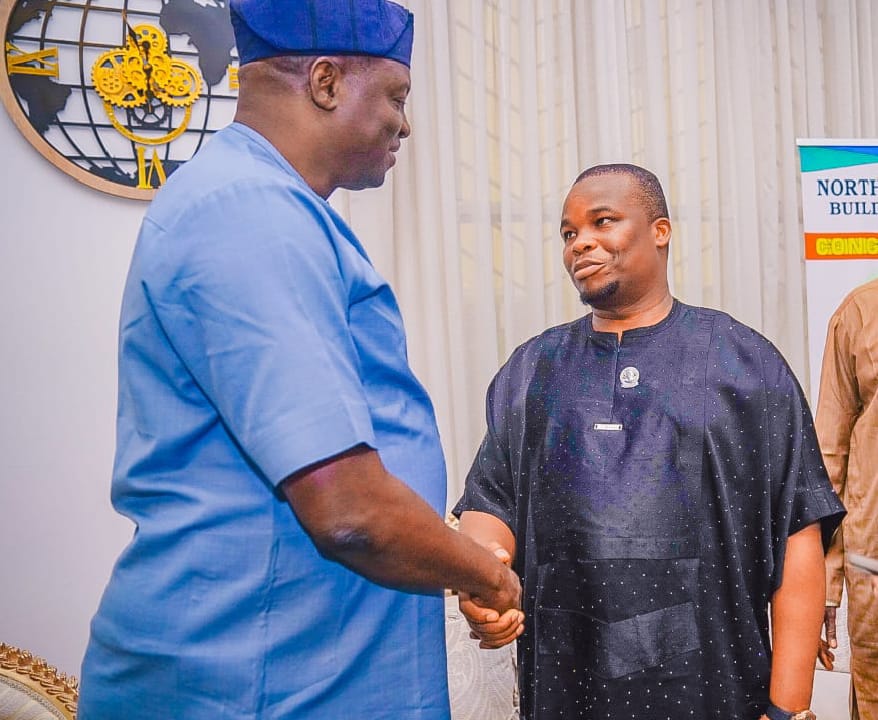
Chief Goodluck Nwaneri, a Director city boy movement, has paid a condolence visit to the APC National Chairman, Prof. Nentawe Yilwatda, at his residence in Abuja, following the passing of his beloved mother, late Mrs. Lydia Toma Yilwatda.
During the visit, Chief Nwaneri expressed his deep sympathy to Prof. Nentawe and the entire Yilwatda family, describing the death of a mother as a painful and irreplaceable loss. He noted that the late Mrs. Lydia Toma Yilwatda lived an exemplary life of faith, humility, and service, evident in the leadership qualities and values instilled in her children.
Chief Nwaneri prayed for the peaceful repose of her soul and asked God to grant the APC National Chairman and his family the strength and fortitude to bear the painful loss. He also encouraged them to find comfort in the enduring legacy their mother left behind.
He further reaffirmed his solidarity with Prof. Nentawe in this moment of grief, while urging the family to remain strong and united in honoring the life and memory of their departed matriarch.
-
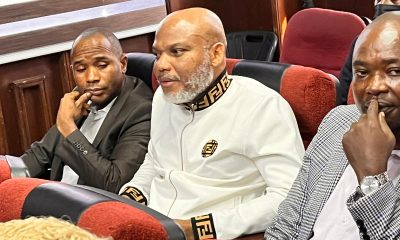
 Abuja3 weeks ago
Abuja3 weeks agoIPOB Leader Nnamdi Kanu Declines to Enter Defence, Insists “No Case” Against Him
-

 World News2 weeks ago
World News2 weeks agoUS Military Submits Contingency Plan for Action in Nigeria
-

 World News3 weeks ago
World News3 weeks agoTrump asks Pentagon to immediately start testing U.S. nuclear weapons
-

 Music3 weeks ago
Music3 weeks agoMusic: Badshah and Davido Launch Cross-Cultural Hit “Wallah Wallah”
-

 Entertainment3 weeks ago
Entertainment3 weeks agoDavido Kicks Off ‘5ive Alive’ Tour with Sold-Out Uyo Stadium Show
-

 Music4 weeks ago
Music4 weeks agoBritish Rapper Dave Unveils Third Studio Album ‘The Boy Who Played the Harp’
-

 Entertainment3 weeks ago
Entertainment3 weeks agoBurna Boy Makes Twitch Debut with PlaqueBoyMax in Freestyle Session
-

 News2 weeks ago
News2 weeks agoGround Operation, Air Strikes Could Be Part of US Attack in Nigeria – Trump
-

 Music News2 weeks ago
Music News2 weeks agoBurna Boy, Davido, Ayra Starr, Wizkid Lead Nigeria’s Charge in 2026 Grammy Nominations
-
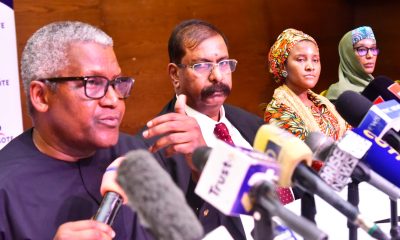
 Business3 weeks ago
Business3 weeks agoAliko Dangote Urges Nigerians to Sell Dollars as Naira Strengthens on Refinery Boost





























